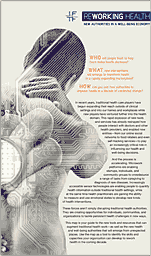Future Now
The IFTF Blog
Reworking Health: Optimizing the Care Effect
From Useful Lies to Useful Medicine
 Kurt Vonnegut’s novel Cat’s Cradle centers around a fictitious religion in which its followers, among other tenants, are told to "Live by the foma that make you brave and kind and healthy and happy." Foma are useful lies.
Kurt Vonnegut’s novel Cat’s Cradle centers around a fictitious religion in which its followers, among other tenants, are told to "Live by the foma that make you brave and kind and healthy and happy." Foma are useful lies.
The point is that something doesn’t need to be accurate or strictly honest to be genuinely helpful—which is, to a certain extent, the historical way we’ve thought about both the potential value and potential ethical quandaries of prescribing placebo effects in health and medicine. For example, in a New York Times column from last year on the growing interest in placebos in medicine, Dr. Danielle Ofri details a clinical encounter from the 1990s when she gave a patient a dose of the fictitious drug "Tylenol #5"—really just an inert saline solution—and used it to alleviate pain that otherwise wouldn’t stop. As Ofri noted in her column:
I felt terribly guilty that I had committed an outright deception with this patient — something that is a true no-no. But on the other hand, it was the first night he got a full night of sleep, to say nothing of all the other patients on the ward and the rest of the staff.
And to an extent, what people are starting to ask is this: How can we get the kind of effect of pain relieving "Tylenol #5" in an ethical and honest way?
In our 2013 research, Reworking Health: New Authorities in a Well-Being Economy, we described this emerging kind of intervention as an effort to move beyond thinking about placebos toward understanding how to optimize the care effect:
The idea of the care effect, in other words, is to understand how to utilize the circumstances and details around a clinical interaction to improve health outcomes.
In the year since we developed this research, we’re seeing signals of efforts to identify ethical ways to optimize this effect. For instance, the Robert Wood Johnson Foundation recently released a report detailing a set of recommendations to build the evidence base for understanding what different placebo effects are and how to use them to advance medical care. The paper is worth reading in detail, but my two main takeaways are: 1) We need a more detailed taxonomy and effort to study and understand how care effects really work, and 2) We need to find ways to use these effects in open and transparent ways.
Put differently: In the next decade, expect an effort to redefine placebos from being useful lies to becoming useful medicine.
In our 2013 Health Horizons research, Reworking Health, we examined four emerging sources of authority—computation, narratives, networks, and ambience—that will fundamentally transform who we trust and what interventions will be available in a rapidly expanding health and well-being marketplace.
This series of blog posts dives into the map's forecasts to reveal new opportunities and help you imagine what skills and capacities you or your organization can develop to rework health in the coming decade:
About IFTF's Health Horizons Program
- Contact Dawn Alva at dalva@iftf.org or 650-233-9585



